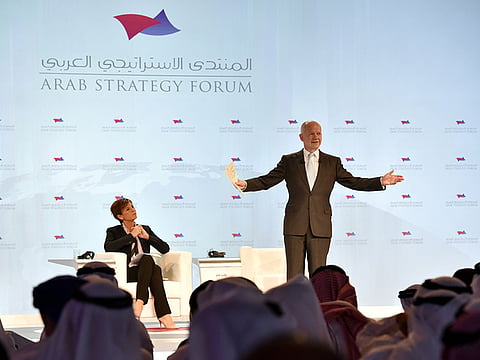UK’s William Hague warns of growing Daesh threat
Ex-Foreign Secretary says more needs to be seen from Arab countries fighting terrorist group

Dubai: Daesh (the self-proclaimed Islamic State of Iraq and the Levant) will be a greater threat to global peace and security in 2016, moving to new territories and recruiting in larger numbers than it did this year, former UK Foreign Secretary William Hague warned on Tuesday.
Hague, speaking at the Arab Strategy Forum in Dubai, said the terrorist group’s strategy will move to finding new areas in the world, like it has already done in Libya, increasing the chances of greater international terrorism.
A new report from the Australian Strategic Report Institute says Daesh is targeting a presence in south-east Asian countries, including Malaysia, Indonesia, Thailand and the Philippines.
Hague’s warning comes the same day United States President Barack Obama said Daesh has lost control over large parts it held in Syria and Iraq after a record number of air strikes in November.
But Hague said Daesh will “probably grow stronger before weaker” in 2016 as the military action in Syria and Iraq pushes them to other parts of the world.
The fight against Daesh “will take a long time” and requires “patience and determination,” he said.
Hague also said a greater, visible effort by Arab countries is necessary to make it clear it is a global and international effort against the terrorist group and “not just the United States,” which he said is playing into Daesh’s propaganda war.
“It’s very important regional resources are used... it will be important to show that we’re all doing this together,” he said.
Several Arab countries, including the United Arab Emirates and Saudi Arabia, joined the international United States’ coalition earlier this year in launching air strikes against Daesh in Syria and Iraq. But the war in Yemen, where Saudi Arabia is leading a US-supported coalition in a fight against Iran-backed rebels to restore the internationally recognised government, has since taken priority.
On Monday, Saudi Arabia announced the formation of a 34-state Islamic military alliance to combat terrorism. The alliance includes the UAE, Egypt, Turkey and Indonesia.
Hague welcomed the formation of the new coalition, calling it an “important alliance” but said if it is going to be effective, it will need to be an integrated alliance.
“To make something like Nato you really have to decide to act tougher and an attack on one is an attack on al, and when your security is indivisible together and you’re prepared to send people to fight and die for another country, so that’s the test of it,” he said.



